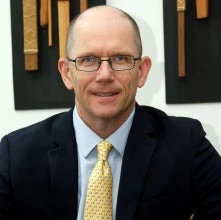
Around the time Marvel’s Black Panther film was breaking box office records across the globe, I met with a high-ranking Ugandan official in Washington, D.C. In the middle of conversation, I asked what I needed to know as the new country manager for Uganda. He leaned over and said, “Uganda is Wakanda!”
On Wednesday, I walked into the closest I have come to the real Wakanda in Uganda- the Innovation Village. A vibrant rainbow of colors on the walls, and rustic wood and metallic furniture create a warm and welcoming space that is home to 2,000 young innovators working for 130 youth-led start-ups. The Village occupies the third floor of Ntinda Complex, a huge gray commercial building in Ntinda on the outskirts of Kampala which describes itself as an ecosystem that leverages innovation, entrepreneurship and technology to deliver solutions to the country’s challenges.
The Village was host to our Innovation Day Out to mark the International Day for the Eradication of Poverty, or End Poverty Day as we call it. Some of the 60 or so young participants we invited had never heard of The Village or the incredible stories our panel of young technology entrepreneurs shared about the challenges and successes of adapting and innovating in a constantly changing world.
There was Evelyn Namara, whose digital vouchers help to deliver development aid transparently; Alfred Opio, whose tablets are pre-packaged with lessons and self-assessment tests for students; Solomon King, founder of Fundi Bots, who is teaching robotics in schools; Brenda Katwesigye, who makes affordable eyewear from recycled plastic, and Allan Rwakatungu has eased online purchases using digital payment solutions, including mobile money.
Such innovations offer a lot of hope in a country where more than 70% of the population are younger than 30 years old, the majority of them without jobs. By 2040, Uganda’s population is expected to double to 80 million at the current 3% annual growth rate. A huge population of young unemployed people can present enormous challenges, but it can also offer limitless opportunities in improved productivity if well-harnessed through investing in quality education and the right skills for the labor market.

Uganda is currently ranked 137 out of 157 countries in human capital development with a Human Capital Index (HCI) of 0.38, which is below the 0.40 index average for Africa. The Index, launched by the World Bank during this year’s Annual Meetings in Indonesia, forecasts a child’s productivity potential using rates of child survival and stunting to measure health; and quality adjusted learning as a measurement of education and knowledge. According to the Index, 95 out of 100 children born in Uganda survive to age five. A child who starts school at age four can expect to complete seven years of school by her 18th birthday. 29 out of 100 children in Uganda are stunted and are at risk of cognitive and physical limitations that can last a lifetime; and 70% of 15-year-olds in Uganda will likely to survive to the age of 60.
With the HCI, the World Bank is scaling up support to countries, including Uganda, to increase investments in human capital that are more likely to enable their citizens realize their full potential and help reduce poverty (at 21% in Uganda) and inequality. From what I could see at The Village, Uganda’s youth are far more prepared to tackle these challenges than we give them credit for. There is huge potential for them to drive innovation, to create jobs, and to collaborate across borders. Business development skills are key to helping them to do business more efficiently and smartly, while the right financing and networks could open doors to upscaling their ideas and venture into other markets.
The World Bank is well positioned to support these aspirations through future convenings on issues that are of interest to young entrepreneurs, share knowledge and global experience, and mobilize additional resources, currently totaling $3 billion in project financing. We are particularly pleased that the Uganda Skills Development Program is supporting employer-led short-term training to address skills imbalances in agriculture, construction and manufacturing through the $21.8m skills development facility being implemented by the Private Sector Foundation of Uganda. We hope to see more young innovators tap into these and similar programs to adapt the changing nature of work and uncertain future.
It seems that young Ugandans are drawn to Wakanda by its positive portrayal of women alongside its scientific and technological advancement. It is a world where anything is possible. Young people like Princess Shuri are equipped to push the boundaries of their imagination and innovation, to realise their full potential and secure Wakanda’s future. Uganda can do the same for its young people. The future starts here.


Join the Conversation